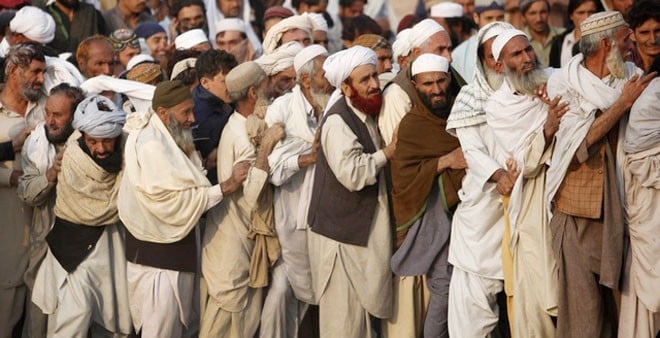

The Internally Displaced Persons (IDPs) are dominating the headlines. Till the next big thing happens, (which it will, inevitably, in the next few days) they will continue to weigh on our collective conscience and there will be calls for help, donations, action and the usual political blame game. That is all very well and, by now, standard fare for TV audiences and newspaper readers. But it is not acceptable for governance and administrative systems. It is not expected of them to be fickle and have attention spans as short as that of the media and the general public.
The ‘system’ is a stable entity which has to think ahead, plan, strategise, implement and follow up. The system may not be taken by surprise because it is meant to anticipate and pre-empt events. So, when the Zarb-e-Azb started and the mass exodus of people began, it was understandable for the TV channels and its audiences to be aghast at the scale of the human plight but the ‘system’ had no excuse. It should have been prepared. It should have seen it coming, months if not years ahead, planned administrative, logistic and budgetary measures and put contingency plans into action on day one with professionalism and efficiency. Instead, it seems to have been taken completely by surprise and is to be found in paralytic inaction, its proverbial jaw hanging in apparent disbelief.
Sadly, we do not learn from our mistakes. After the earthquake and the floods of the recent past, it was realised that the biggest victims of emergency situations are women and children, along with the elderly and the disabled. Even when their basic needs of shelter and food were met, these groups remained neglected.
An advocacy campaign was launched to address this gap in disaster risk management and a specific intervention called the Minimum Initial Services Package (MISP) was recommended to the authorities. The MISP is a set of pre-packed kits with equipment and detailed instructions to address the needs of these vulnerable groups in emergencies. It does not require a needs-assessment survey of the population at risk but can be put to work on day one saving precious lives and creating safe, culturally sensitive spaces and protocols for the vulnerable.
These are standard kits tested in emergency situations worldwide and considered mandatory in other countries. The concept was introduced to the provincial and federal disaster management authorities. Notifications were issued by most provincial authorities and verbal assurances from the National Authority that the MISP would be incorporated in the Standard Operating Procedures (SOPs) of the respective authorities.
The process entailed training, capacity building of various service providers from the health department, local administration, police, transport and child protection authorities etc, procurement (or local preparation) of the kits and their storage in appropriate warehouses for fast dispersal. However, it may be assumed that these crucial steps were not taken, otherwise we would not be hearing that hundreds of women IDPs are delivering children on the roadsides and that families are reluctant to come to the camps because their strong tribal and cultural values are not being respected.
Purdah for the women, separate toilets, lady doctors, personal hygiene issues, reproductive health and all other such matters are being neglected -- things that would have been routinely handled if the MISP was in place.
A sensitive and careful handling of these fellow Pakistanis is not only a moral imperative but also a unique opportunity for us to win over their hearts. But once again, the ‘system’ has been found wanting and the army and the civil society are scrambling to come to the rescue.
The army is engaged on the front and that is where it should be allowed to focus, while the civil society should only be willing followers, not leaders of any initiative. We are all good people with kind hearts and pious intentions. We will invoke the spirit of Ramzan and the ever-ready-to-jump-out-of-the-bottle genie of patriotism. We will all do our bit but it will never be enough. What is needed is cold, logical, well planned, efficiently executed action, by a well-oiled government machinery, which is spurred on by the zeal to serve.
I write this as a health professional. I have no axes to grind, no sides to take. I ask a simple question. Where is that government machinery?